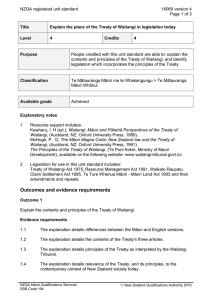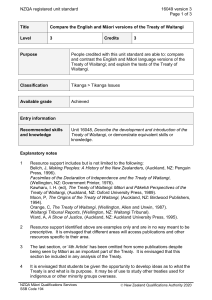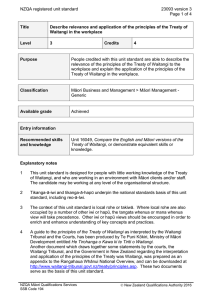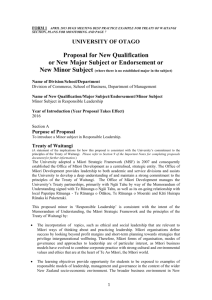NZQA registered unit standard 16050 version 3 Page 1 of 4
advertisement
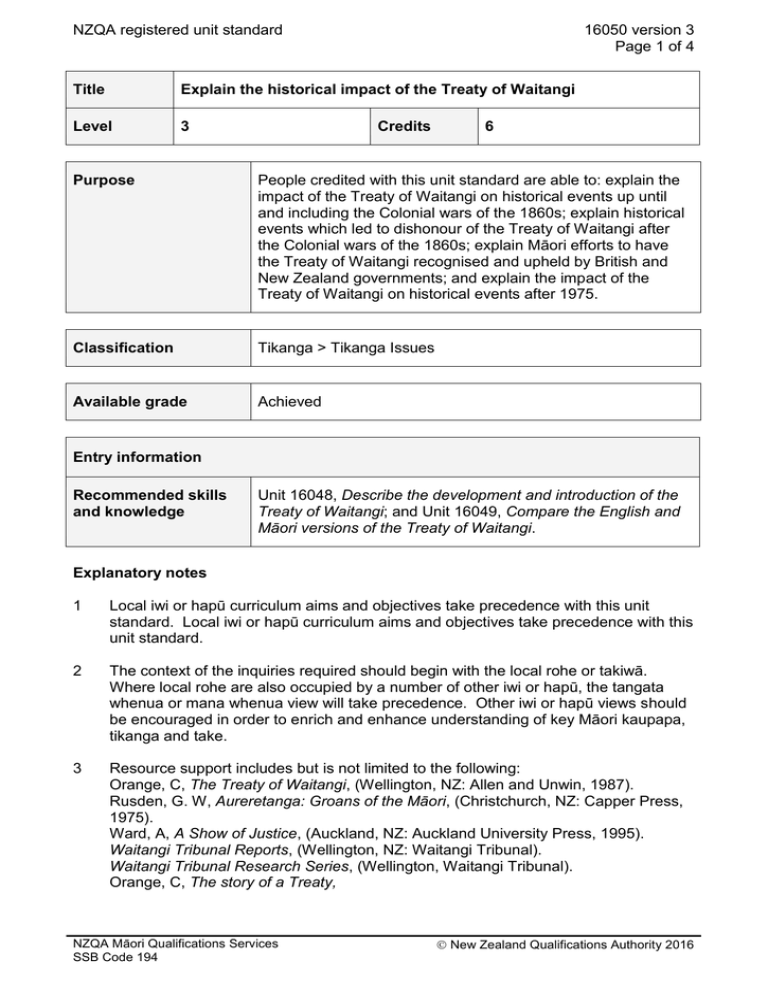
NZQA registered unit standard 16050 version 3 Page 1 of 4 Title Explain the historical impact of the Treaty of Waitangi Level 3 Credits 6 Purpose People credited with this unit standard are able to: explain the impact of the Treaty of Waitangi on historical events up until and including the Colonial wars of the 1860s; explain historical events which led to dishonour of the Treaty of Waitangi after the Colonial wars of the 1860s; explain Māori efforts to have the Treaty of Waitangi recognised and upheld by British and New Zealand governments; and explain the impact of the Treaty of Waitangi on historical events after 1975. Classification Tikanga > Tikanga Issues Available grade Achieved Entry information Recommended skills and knowledge Unit 16048, Describe the development and introduction of the Treaty of Waitangi; and Unit 16049, Compare the English and Māori versions of the Treaty of Waitangi. Explanatory notes 1 Local iwi or hapū curriculum aims and objectives take precedence with this unit standard. Local iwi or hapū curriculum aims and objectives take precedence with this unit standard. 2 The context of the inquiries required should begin with the local rohe or takiwā. Where local rohe are also occupied by a number of other iwi or hapū, the tangata whenua or mana whenua view will take precedence. Other iwi or hapū views should be encouraged in order to enrich and enhance understanding of key Māori kaupapa, tikanga and take. 3 Resource support includes but is not limited to the following: Orange, C, The Treaty of Waitangi, (Wellington, NZ: Allen and Unwin, 1987). Rusden, G. W, Aureretanga: Groans of the Māori, (Christchurch, NZ: Capper Press, 1975). Ward, A, A Show of Justice, (Auckland, NZ: Auckland University Press, 1995). Waitangi Tribunal Reports, (Wellington, NZ: Waitangi Tribunal). Waitangi Tribunal Research Series, (Wellington, Waitangi Tribunal). Orange, C, The story of a Treaty, NZQA Māori Qualifications Services SSB Code 194 New Zealand Qualifications Authority 2016 NZQA registered unit standard 16050 version 3 Page 2 of 4 4 Resource support identified above are examples only and are in no way meant to be prescriptive. It is envisaged that different areas will access publications and other resources specific to their area. 5 The impact of the Treaty of Waitangi on the history of Aotearoa continues to be debated. Many Māori still see the Treaty as the covenant that binds Māori and Pākehā. It is also seen as a Treaty that was never honoured or was ignored by a succession of governments. The Treaty provided the opportunity for the British to take control of the management and, eventually, the sovereignty of the land. The Treaty laid the platform for government and the legislation that followed. 6 Differences between iwi and rohe There are significant differences between iwi and rohe understandings and the significance given to the Treaty, which should be acknowledged by the candidate. Many iwi never signed the Treaty. Outcomes and evidence requirements Outcome 1 Explain the impact of the Treaty of Waitangi on historical events up until and including the Colonial wars of the 1860s. Evidence requirements 1.1 The explanation details different views amongst Māori throughout the country towards the Treaty of Waitangi. Range evidence required of three views. 1.2 The explanation details the contribution of the Treaty to the establishment of government and subsequent introduction of legislation. 1.3 The explanation details historical events and legislation introduced up until 1860 which impacted specifically on Māori. Outcome 2 Explain historical events which led to dishonour of the Treaty of Waitangi after the Colonial wars of the 1860s. Evidence requirements 2.1 The explanation details dishonouring of the rights of iwi and hapū over their possessions. 2.2 The explanation details dishonouring of the rights of Māori as citizens under the protection of the Crown. 2.3 The explanation details dishonouring of the rights of iwi and hapū to self management. NZQA Māori Qualifications Services SSB Code 194 New Zealand Qualifications Authority 2016 NZQA registered unit standard 16050 version 3 Page 3 of 4 Outcome 3 Explain Māori efforts to have the Treaty of Waitangi recognised and upheld by British and New Zealand governments. Evidence requirements 3.1 The explanation details representations by Māori to the British government and the monarchy. 3.2 The explanation details representations by Māori to the New Zealand government. 3.3 The explanation details outcomes of the representations. Outcome 4 Explain the impact of the Treaty of Waitangi on historical events after 1975. Evidence requirements 4.1 The explanation details the development of the land protest movement and its impact on the place of the Treaty in society. 4.2 The explanation details the impact of the Treaty of Waitangi Act 1975. 4.3 The explanation details the role and work of the Treaty of Waitangi Tribunal. 4.4 The explanation identifies key events which have arisen from Treaty based initiatives. Planned review date 31 December 2016 Status information and last date for assessment for superseded versions Process Version Date Last Date for Assessment Registration 1 29 June 1999 31 December 2015 Review 2 19 December 2003 31 December 2015 Rollover and Revision 3 12 December 2013 N/A Consent and Moderation Requirements (CMR) reference 0226 This CMR can be accessed at http://www.nzqa.govt.nz/framework/search/index.do. NZQA Māori Qualifications Services SSB Code 194 New Zealand Qualifications Authority 2016 NZQA registered unit standard 16050 version 3 Page 4 of 4 Please note Providers must be granted consent to assess against standards (accredited) by NZQA, before they can report credits from assessment against unit standards or deliver courses of study leading to that assessment. Industry Training Organisations must be granted consent to assess against standards by NZQA before they can register credits from assessment against unit standards. Providers and Industry Training Organisations, which have been granted consent and which are assessing against unit standards must engage with the moderation system that applies to those standards. Requirements for consent to assess and an outline of the moderation system that applies to this standard are outlined in the Consent and Moderation Requirements (CMR). The CMR also includes useful information about special requirements for organisations wishing to develop education and training programmes, such as minimum qualifications for tutors and assessors, and special resource requirements. Comments on this unit standard Please contact the NZQA Māori Qualifications Services mqs@nzqa.govt.nz if you wish to suggest changes to the content of this unit standard. NZQA Māori Qualifications Services SSB Code 194 New Zealand Qualifications Authority 2016
